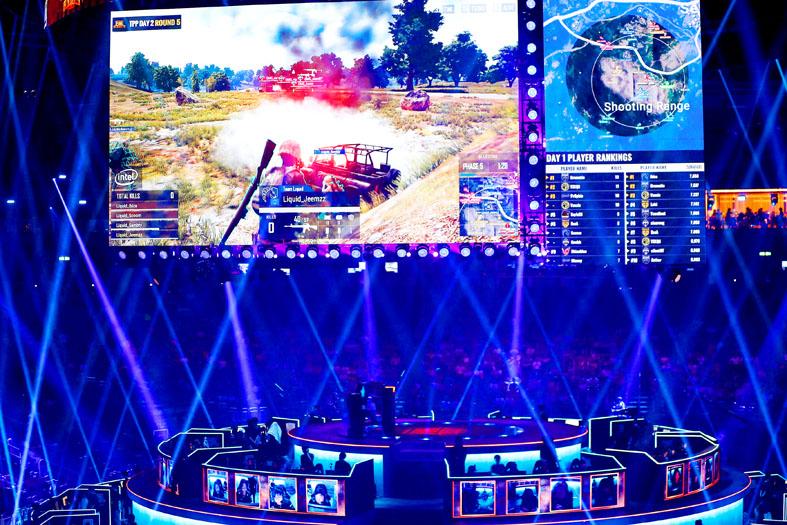Shares of Krafton Inc, creator of the hit video game PUBG: Battlegrounds, plummeted yesterday on their debut after the company pulled off a US$3.8 billion initial public offering (IPO) that was South Korea’s biggest in more than a decade.
The shares fell as much as 20 percent before closing 8.8 percent down, becoming the first on the KOSPI to drop on debut this year.
The firm backed by Tencent Holdings Ltd (騰訊), which cut its offering by more than 1 trillion won (US$870 million) after regulators questioned its valuation, is grappling with concerns about its dependence on PUBG: Battlegrounds for almost all its revenue and tightening scrutiny over China’s gaming arena.

Photo: Reuters
Seoul-based Krafton’s debut was the second-largest in the nation after Samsung Life Insurance Co’s US$4.3 billion listing in 2010.
It joins a growing list of tech companies and start-ups going public in an IPO boom that is reshaping the nation’s corporate landscape.
The company ended yesterday with a valuation of 22 trillion won, surpassing more established industry names such as Nexon Co and Take-Two Interactive Software Inc.
However, its sheer size discouraged some investors and Krafton underperformed other recent debutantes. Shares of KakaoBank Corp, South Korea’s first Internet-only lender, jumped 79 percent on its debut on Friday last week, exceeding the valuations of the nation’s traditional financial groups.
There are also fears that Beijing is preparing to crack down on the domestic industry after state media last week decried the “spiritual opium” of gaming, potentially constraining one of Krafton’s biggest markets.
“The size of the share float was too big,” Heungkuk Securities Co analyst Choi Jong-kyung said, adding that Krafton’s IPO was more than 1.5 times bigger than that of KakaoBank. “There was also bad news from China during Krafton’s IPO share subscription.”
Founder Chang Byung-gyu’s 14 percent stake in Krafton had been valued at 3.5 trillion won based on the IPO price, according to the Bloomberg Billionaires Index.
He joins a growing list of self-made billionaires in a nation where family-run conglomerates have controlled the bulk of wealth for decades.
Brian Kim, the founder of messaging giant Kakao Corp, is now the nation’s richest person with US$13.2 billion, ahead of Samsung Group’s Jay Y. Lee.
Krafton’s debut puts it alongside some of its region’s biggest game developers including Nexon, worth about US$17 billion, and NCSoft Corp, valued at about US$15.5 billion.
It is fairly unique in its extreme reliance on a single title, with PUBG: Battlegrounds accounting for 96.7 percent of Krafton’s sales in the first quarter.
The PC and console versions of the game had sold more than 75 million copies as of March, and the mobile version was the most-downloaded game in more than 150 nations.
The 14-year-old company, which runs five game studios, is attempting to transform into an entertainment giant by offering animated movies and deep learning-based interactive content around its PUBG: Battlegrounds fantasy universe.
It is planning to launch a new game, PUBG: New State, later this year and a survival horror title, The Callisto Protocol, next year.

On Tuesday, US President Donald Trump weighed in on a pressing national issue: The rebranding of a restaurant chain. Last week, Cracker Barrel, a Tennessee company whose nationwide locations lean heavily on a cozy, old-timey aesthetic — “rocking chairs on the porch, a warm fire in the hearth, peg games on the table” — announced it was updating its logo. Uncle Herschel, the man who once appeared next to the letters with a barrel, was gone. It sparked ire on the right, with Donald Trump Jr leading a charge against the rebranding: “WTF is wrong with Cracker Barrel?!” Later, Trump Sr weighed

Taiwan Semiconductor Manufacturing Co (TSMC, 台積電) secured a record 70.2 percent share of the global foundry business in the second quarter, up from 67.6 percent the previous quarter, and continued widening its lead over second-placed Samsung Electronics Co, TrendForce Corp (集邦科技) said on Monday. TSMC posted US$30.24 billion in sales in the April-to-June period, up 18.5 percent from the previous quarter, driven by major smartphone customers entering their ramp-up cycle and robust demand for artificial intelligence chips, laptops and PCs, which boosted wafer shipments and average selling prices, TrendForce said in a report. Samsung’s sales also grew in the second quarter, up

HEADWINDS: Upfront investment is unavoidable in the merger, but cost savings would materialize over time, TS Financial Holding Co president Welch Lin said TS Financial Holding Co (台新新光金控) said it would take about two years before the benefits of its merger with Shin Kong Financial Holding Co (新光金控) become evident, as the group prioritizes the consolidation of its major subsidiaries. “The group’s priority is to complete the consolidation of different subsidiaries,” Welch Lin (林維俊), president of the nation’s fourth-largest financial conglomerate by assets, told reporters during its first earnings briefing since the merger took effect on July 24. The asset management units are scheduled to merge in November, followed by life insurance in January next year and securities operations in April, Lin said. Banking integration,

LOOPHOLES: The move is to end a break that was aiding foreign producers without any similar benefit for US manufacturers, the US Department of Commerce said US President Donald Trump’s administration would make it harder for Samsung Electronics Co and SK Hynix Inc to ship critical equipment to their chipmaking operations in China, dealing a potential blow to the companies’ production in the world’s largest semiconductor market. The US Department of Commerce in a notice published on Friday said that it was revoking waivers for Samsung and SK Hynix to use US technologies in their Chinese operations. The companies had been operating in China under regulations that allow them to import chipmaking equipment without applying for a new license each time. The move would revise what is known